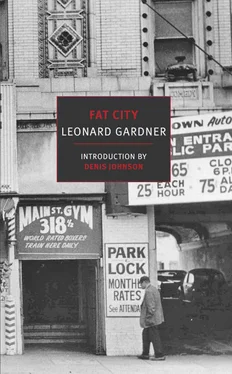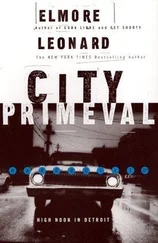Leonard Gardner - Fat City
Здесь есть возможность читать онлайн «Leonard Gardner - Fat City» весь текст электронной книги совершенно бесплатно (целиком полную версию без сокращений). В некоторых случаях можно слушать аудио, скачать через торрент в формате fb2 и присутствует краткое содержание. Год выпуска: 2015, Издательство: NYRB Classics, Жанр: Современная проза, на английском языке. Описание произведения, (предисловие) а так же отзывы посетителей доступны на портале библиотеки ЛибКат.
- Название:Fat City
- Автор:
- Издательство:NYRB Classics
- Жанр:
- Год:2015
- ISBN:нет данных
- Рейтинг книги:5 / 5. Голосов: 1
-
Избранное:Добавить в избранное
- Отзывы:
-
Ваша оценка:
- 100
- 1
- 2
- 3
- 4
- 5
Fat City: краткое содержание, описание и аннотация
Предлагаем к чтению аннотацию, описание, краткое содержание или предисловие (зависит от того, что написал сам автор книги «Fat City»). Если вы не нашли необходимую информацию о книге — напишите в комментариях, мы постараемся отыскать её.
Fat City — читать онлайн бесплатно полную книгу (весь текст) целиком
Ниже представлен текст книги, разбитый по страницам. Система сохранения места последней прочитанной страницы, позволяет с удобством читать онлайн бесплатно книгу «Fat City», без необходимости каждый раз заново искать на чём Вы остановились. Поставьте закладку, и сможете в любой момент перейти на страницу, на которой закончили чтение.
Интервал:
Закладка:
“What did you say? Listen, I don’t have to take that. You’re liable to get backhanded right off that stool someday.”
“See if I care one bit. That’s all I need. Go ahead if it’ll make you happy.”
“Forget it. I was kidding.”
“Get it out of your system, go on, if it’ll do you good, if that’s what you need to feel like you’re somebody.”
“Oh, Christ,” said Tully, turning away.
“Knock some teeth out while you’re at it. I still got a few of my own in there the others were nice enough to leave me.”
“God almighty. I wouldn’t hit you.”
“It shouldn’t be too hard. What you waiting for? There’s nothing I can do to stop you. It ought to be a big lift for you. Just the thing you need. Don’t let it worry you. Far be it from me to spoil anybody’s fun. Go on, since you got your mind made up. If that’s how you get your kicks, I guess I’ll do as well as anybody else.”
Groaning, elbows on the bar, he put his face in his hands and for a moment it was as if his wife were again berating him. “Okay, okay, okay, I’m sorry,” he said into his hands, his one impulse to mollify her, to keep her with him by his penitential pose. “I’m trying to tell you I’m sorry, believe me. Listen, I’m sorry. Will you listen to me? I’m sorry .”
“Well, so what? So you’re sorry.”
Baffled, Tully was in a turmoil. There was nothing he could do. Caught where he had been so many times before, he felt he would slam his hateful head on the bar if she did not forgive him. “I feel I could just break my head,” he said.
“I wouldn’t stop you.”
“I feel like beating my head on the bar,” he warned.
“Go ahead.”
With a loud knock his forehead struck the varnished wood. Her hands were on him then; she held him by the shoulder and under the chin and there was strength in her arms. Taking up his glass he toasted the staring faces. He was feeling good again; he had regained his authority.
“What did you want to do that for?”
“You can count on me right down the line,” he said.
“You want to knock your brains out?”
“You can count on me. Don’t you believe me?”
“I get along all right.”
“Listen, let me tell you something. You can count on me right down the line.”
“I thought you wanted to hit me.”
“Forget that, will you? I never hit a woman in my life. I’m not that kind of lousy bastard. Ask anybody. I won’t let a friend down. Let me buy you a drink. Don’t you think you can count on me?”
“Just don’t bump your head any more.”
“Will you forget that? I asked you a question. Do you think I’d let you down?”
“I don’t know, would you?”
“I wouldn’t.”
“Maybe you wouldn’t. After all, I mean, how would I know?”
“You can count… on… me,” he declared to emphatic slaps on the bar. “I’m the reliable type. You think I’m kidding, don’t you? You can count me among your friends. Don’t you believe me? Any time you need anything, come see me. You’re all right. I mean that.”
“Well, I like that about you. You know who your friends are.”
“That’s right.”
“These others I wouldn’t ask for the time of day.”
“They wouldn’t give it to you.”
“You’re the only son-of-a-bitch that’s worth a shit in this place.”
“I appreciate that. I mean because there’s something I like about you.” Tully sat with his arm around her neck. The crisis was past, the confusing emotions gone so quickly it was as if that brief desperate turbulence had no significance. He felt loose and supple. His scalp was tingling from a sensation of astonishing intimacy.
When they went out together he was fondling her curly head. And he was in control now, talking rapidly to allow no interruption, trying to circumvent all possible subjects for contention in order to remain in favor. At the door, during a crescendo of trumpets and guitars, he glanced back over his shoulder in leering triumph, but no one was looking at him. A cooling breeze had risen. The sky was clear; the Big Dipper tilted over Center Street. Tully realized how drunk he was when he stopped on the sidewalk for a kiss and, eyes closed, pleased at finding he was the taller, lost his balance. Oma had surged against him, and as they walked on, his arm across her back, hers at his waist, she continued to lean against him, forcing him toward walls and store windows.
“You all right?” he asked.
“I don’t know.”
“Can you make it?”
“I guess I’m drunk.”
“I’ll get you home. Don’t worry about anything. You can count on me. We going the right way?”
When she began to cry, he was moved by a sudden conjugal sympathy. “I love you so much,” she said, and it was such an unexpected confession that he felt he had never been so happy. Pulling her up the dark stairway to her room, he felt that from now on everything would be different.
16
Billy Tully’s suitcase stood empty in the closet; his coats, slacks and shirts hung from wire hangers, and beside the suitcase and his canvas athletic bag was a carton filled with Earl’s clothes that Oma had taken down from hangers and removed from the dresser drawer where Tully’s gray underwear now was neatly stacked. The underwear he had ceased wearing, the T-shirts because of the heat, the tattered jockey shorts ostensibly for the same reason, but also abandoned for the sake of virility. He had found that hanging free facilitated desire. He was trying to be compatible. Though able enough, he felt he was a lover more from duty than from inclination. With his wife he had not had to try. From her he had met with reprimands for inopportune fondling, for lingering about, trying to embrace her over the sink or on her way between stove and refrigerator, for entering the bathroom to ask if he could join her in the tub. At times his wife had been coyly elusive, insinuating rewards for deferment, at times cross, shouting that he interfered with her housework and allowed her no peace. Then he had been hurt and sulked on the sofa, silently cursing her and grinding his teeth. Eventually he had gone to her with apologies and contrite embraces that again brought on a burgeoning of desire. That desire, that yearning for her, had been the foundation of his marriage, and after she was gone it had not left him. He yearned for her even while holding Oma Lee Greer in his arms.
On nights when Tully could not bear to hold Oma at all, after hours of bickering had made her so repulsive to him that he shrank from touching her, his desire for his wife was acute. Writhing in the darkness, he pined finally for any woman, other than the one beside him. On other, easier, nights, he enjoyed her with indifferent flamboyant vigor. But afterwards he experienced none of the affectionate gratitude he had felt for Lynn. He lay quietly, oppressed by a sense of dwindling life, of his youth dwindling away as he rested beside a woman he should never have known, here so far off the course he knew should have been his that he wondered with panic if it had been lost forever. He could feel no love, and the anguish of a life without it was greater now than when he had lived alone. Then at least there had been the anticipation; now, though there were comforts, there was no hope except in eventual escape, and of that he did not feel capable. When he imagined escape it was always to his wife that he fled, yet when an argument offered the break with Oma he had wished for, he knew, in the soberness of fear, that his wife was gone from him forever, that the course of his life could be no other than what it was, that without Oma he would be alone, that he was lucky to have her and would have to soothe her, agree with her and try in the future not to vex her. He rendered to her the same apologies and declarations he had rendered to his wife, and afterwards he felt a sad sense of sacrilege. Sometimes after Oma had gone to bed he stayed up with the light out and continued drinking by the open window, through which the warm September air, faint music, voices, the sound of shattering glass, the hum of cars and rumble of trucks entered with flashes of light that played over the sleeping form under the sheet, and he felt the guilt of inaction, of simply waiting while his life went to waste. No one was worth the gift of his life, no one could possibly be worth that. It belonged to him alone, and he did not deserve it either, because he was letting it waste. It was getting away from him and he made no effort to stop it. He did not know how. He fought urges to hurl his tumbler out the window. The chair he sat on smashed in his mind against the wall. Yearning for struggle and release, he felt he had to fight, as he had felt years before when he had come home from the army to begin his life and confronted the fact that there was nothing he wanted to do. But then he had had youth, and several service championships. His mother had died when he was a senior in high school, but his father and a brother and sister had still been in town. Now they were all gone, his father remarried and living in Phoenix, the brother in the Marine Corps, the sister living with her husband at Fort Dix, New Jersey. The last he had seen of any of them was over two years ago when he and Lynn had gone to visit his father prior to kidney surgery. But his father had passed the stones in the hospital and, relieved of the doleful prospect of an operation, had soon begun attacking his summoned offspring with the sarcasm of earlier years. A small red-faced, alcoholic cement finisher with brown teeth and an Oklahoma accent, the old man had got up from the hospital bed, gone home and got drunk. On the back porch, after a shouted quarrel with his father, Tully and his brother and his father’s wife had almost fought over the question of how much indulgence a son owed. Since then Tully had written a few postcards, but had seen none of his family. He thought of them with neither fondness nor dislike nor curiosity. He had left them behind, he told himself, the only one still here in the city where they had last lived together.
Читать дальшеИнтервал:
Закладка:
Похожие книги на «Fat City»
Представляем Вашему вниманию похожие книги на «Fat City» списком для выбора. Мы отобрали схожую по названию и смыслу литературу в надежде предоставить читателям больше вариантов отыскать новые, интересные, ещё непрочитанные произведения.
Обсуждение, отзывы о книге «Fat City» и просто собственные мнения читателей. Оставьте ваши комментарии, напишите, что Вы думаете о произведении, его смысле или главных героях. Укажите что конкретно понравилось, а что нет, и почему Вы так считаете.












